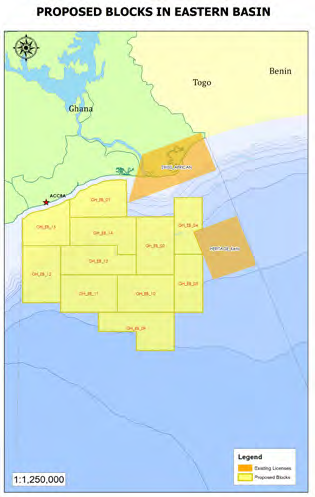Proposed blocks in Eastern Basin
With Ghana poised to implement a major multi client 3D geophysical survey in the relatively underexplored but highly prospective Eastern (Keta) basin offshore Ghana, strong indications are emerging that the basin could easily overtake the Western Tano offshore basin as Ghana’s next oil and gas hotspot. Initial observations point to some very exciting prospects. “Whilst the primary play will undoubtedly be the late Cretaceous turbiditic channels found in Jubilee, we are also excited about the possibility of extensive late Cretaceous and Tertiary basin floor fans containing very large volumes of hydrocarbons, which could exceed the existing discoveries offshore Ghana,” said Thomas Tsiboe-Darko, TG-Geopartners managing director.
TG-Geopartners, working with Ghana’s Petroleum Commission, is driving the acquisition of 14,000 square kilometres of 3D long-offset broadband multi-client seismic over open blocks that will be available for application. Advanced new acquisition and imaging techniques will provide improved illumination of complex structures. The seismic shoot is expected to begin in early 2021, and could take up to 10 months to complete, with final processed volumes available in both time and depth by the second quarter of 2022.
he use of new imaging technologies will help improve subsurface understanding and increase exploration success rates. “The upcoming new multiclient 3D seismic acquisition programme will help unlock and accelerate development of what will surely be the next wave of major oil discoveries in Ghana.” Ghana says it is looking for established producers, oil majors, with deep pockets, relevant expertise and experience, to negotiate a deal for the allocation of oil blocks. In August 2020, the Ministry of Energy unexpectedly issued a public invitation to interested explorers and producers to apply for “direct negotiations” for 11 offshore blocks in the Eastern (Keta) basin.
The basin had previously attracted a huge interest from some oil majors. But checks by Offshore Africa suggest the Covid-19 pandemic, persistent low oil prices and the long-term threat posed by the energy transition phenomenon had muted enthusiasm.


